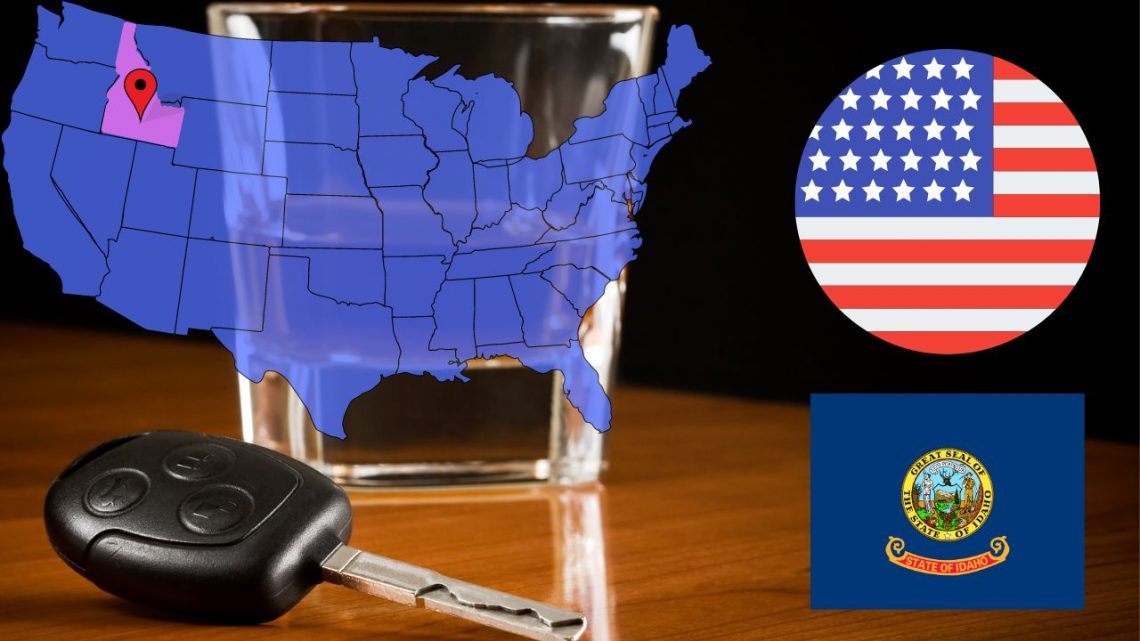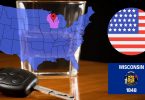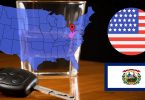In Idaho, the legal limit for blood alcohol concentration (BAC) is set at 0.08%, equivalent to 80 milligrams of alcohol per 100 milliliters of blood.
Please remember that the primary purpose of this post is to inform readers about drunk driving in Idaho. This page intends no endorsement or promotion of drunk driving.
What is the legal alcohol limit for driving in Idaho?
In Idaho, the legal alcohol limit for driving varies depending on the type of driver’s license and the driver’s age. These limits are set to ensure the safety of all road users and to minimize alcohol-related accidents. Below is a breakdown of the legal Blood Alcohol Concentration (BAC) limits for different categories of drivers:
- Regular Drivers: The legal BAC limit is 0.08%. This applies to the majority of drivers operating personal vehicles.
- Commercial License Drivers: For those holding a commercial driver’s license (CDL), the legal BAC limit is reduced to 0.04%, reflecting the higher standards expected due to the nature of their vehicle operation.
- Drivers Under 21 Years Old: Idaho enforces a zero-tolerance policy for underage drinking and driving. Therefore, drivers under the age of 21 are prohibited from driving with a BAC of 0.02% or higher.
Drink and Drive Penalties and Punishments in Idaho
In Idaho, driving under the influence (DUI) is a serious offense, and the state’s law enforcement officers are rigorously trained to detect individuals operating vehicles while impaired. With over 10,000 DUI arrests occurring annually in Idaho, the likelihood of being apprehended for DUI is significant. If a police officer suspects you of DUI, you will be required to undergo a Blood Alcohol Concentration (BAC) test. Refusal to take this test leads to immediate consequences, including the suspension of your driver’s license for one year and a $250 civil penalty. In cases of suspected drug use, additional testing may be requested by the officer.
It is essential to be aware of the varying levels of penalties and punishments associated with DUI offenses in Idaho:
The FIRST DUI Offense:
- Classification: Misdemeanor violation
- Jail Time: Up to 6 months
- Fines: Up to $1,000
- License Suspension: 90 to 180 days
The SECOND DUI Offense within 10 Years:
- Classification: Misdemeanor violation
- Jail Time: 10 days mandatory, up to 1 year
- Fines: Up to $2,000
- License Suspension: 1 year mandatory (post-confinement), no driving privileges of any kind
- Ignition Interlock: Mandatory installation
The THIRD DUI Offense within 10 Years:
- Classification: Felony violation
- Jail Time: 30 days mandatory, up to 5 years
- Fines: Up to $5,000
- License Suspension: Up to 5 years, with 1 year mandatory post-confinement, no driving privileges of any kind
- Ignition Interlock: Mandatory installation
First Offense (Commercial License or Underage Drivers):
- Classification: Misdemeanor violation
- Jail Time: 10 days mandatory, up to 1 year
- Fines: Up to $2,000
- License Suspension: 1 year mandatory (post-confinement), no driving privileges of any kind
Second Offense within 5 Years (Commercial License or Underage Drivers):
- Classification: Felony violation
- Jail Time: Minimum 30 days in county jail, up to 5 years in state penitentiary
- Fines: Up to $5,000
- License Suspension: Up to 5 years, with 1 year mandatory post-confinement, no driving privileges of any kind
- Ignition Interlock: Mandatory installation
Aggravated DUI: Committing a DUI that causes serious injury to another person is a felony. Penalties for aggravated DUI include enhanced jail time, increased fines, and extended driving suspension.
To combat repeat DUI offenses, Idaho mandates the installation of a Breath Alcohol Ignition Interlock Device (BAIID) in vehicles driven by repeat offenders. This device prevents the car from starting if it detects alcohol in the driver’s breath sample.
Given the severity and complexity of these laws, it’s crucial to stay updated on any changes. Therefore, regularly checking the official state website for the latest information on DUI laws and penalties in Idaho is highly recommended.
How Can I Calculate if My Blood Alcohol Limit is Legal in Idaho?
In Idaho, as in the rest of the United States, law enforcement officers utilize Blood Alcohol Concentration (BAC) tests to determine if an individual is driving under the influence (DUI). These tests are designed to measure the amount of alcohol in your bloodstream to ensure drivers do not exceed the legal BAC limit of 0.08% for regular drivers, 0.04% for commercial license holders, and 0.02% for drivers under 21 years of age. Police officers may use breathalyzers during traffic stops to quickly assess a driver’s sobriety.
As an experienced phlebotomist with a decade of expertise, I recommend the following methods to check your BAC level, providing a good indication of whether you’re within the legal limit to drive:
- Use a High-Quality Alcohol Breathalyzer: For those looking to self-assess their BAC, the BACtrack S80 is one of the most reliable options available in Idaho. It is renowned for its professional-grade accuracy and has endorsements from the Department of Transportation (DOT) & National Highway Traffic Safety Administration (NHTSA), in addition to being FDA 510(k) cleared. Keeping a device like the BACtrack S80 in your vehicle can be a prudent measure, as it helps in making informed decisions by providing a clear indication of your BAC level. This is particularly useful given that it’s common for individuals to misjudge their own impairment levels.
- Utilize My BAC Calculator: Together with a team of phlebotomists and web developers, I’ve developed an online BAC calculator designed to estimate your blood alcohol content based on the quantity of alcohol consumed, your weight, gender, and the time elapsed since your first drink. This tool is accessible online and can be a quick way to gauge your sobriety before deciding to drive.
It’s important to remember that while both these methods offer valuable insights into your BAC level, they do not guarantee 100% accuracy due to the variability in how individuals metabolize alcohol. Factors such as your metabolic rate, medications, health conditions, and recent food intake can affect BAC readings. Therefore, these tools should be used as guides rather than definitive indicators of your legal capacity to drive.
Ultimately, if there’s any doubt about your sobriety, the safest course of action is to not drive. Employing these methods can help you make better decisions and potentially prevent the risk of DUI charges, ensuring both your safety and that of other road users.
Ways to Avoid Driving with a High BAC in Idaho

Driving with a high Blood Alcohol Concentration (BAC) is not only illegal but also poses a significant risk to yourself and others on the road. In Idaho, where DUI laws are strictly enforced, it’s crucial to plan ahead if you intend to consume alcohol. Here are some practical tips and recommendations to ensure you get home safely without risking a DUI charge:
- Utilize Ride-Sharing Apps or Local Taxi Services: One of the simplest and most effective ways to avoid driving under the influence is to use taxi or ride-sharing services. Apps like Uber and Lyft offer convenient and safe transportation options at the tap of a button. For those in specific cities like Boise City, local taxi companies such as Boise Express Taxi provide reliable services. Similarly, in Meridian, Green City Taxi is an excellent choice. These services are readily available and can be a hassle-free alternative to driving yourself home after drinking.
- Order a Designated Driver Service: If you find yourself in a situation where you’ve driven to a location and consumed alcohol, leaving your car behind might not be your preferred option. Fortunately, designated driver services offer a solution. In Boise City, services like DADD (Designated Driver Service) will send a driver to take you and your car home. Similarly, in Meridian, Majestic Limo and Chauffeur services can ensure you and your vehicle get home safely. A quick search for “designated driver service” in your city will provide you with options that cater to this need.
These preventative measures not only help in avoiding legal consequences but also contribute to the overall safety on the roads. By planning how you’ll get home before you start drinking, you can enjoy your social activities without the worry of how to get back safely. Remember, the cost of a taxi or designated driver service is always lower than the cost associated with a DUI offense, not to mention the potential harm you could avoid to yourself and others. Making responsible choices helps keep Idaho roads safe for everyone.
Sticking to Impaired Driving Laws in Idaho: Sad Statistics
Driving under the influence is illegal in Idaho, with laws strictly prohibiting operating a vehicle while impaired by alcohol or other substances. In a recent year, 214 fatal accidents in Idaho were linked to drunk driving, with 29% involving drivers exceeding the legal BAC limit of 0.08%.
To avoid DUI charges and ensure road safety, it’s essential to adhere to Idaho’s BAC regulations. Opt for alternate transportation methods, such as taxis or designated driver services, if you’ve consumed alcohol. Regularly check Idaho’s official website for updates on DUI laws.
Remember, the safest choice is always to avoid driving after drinking. If you believe you must drive, ensure your BAC is within legal limits, using a reliable breathalyzer for accuracy. Staying informed and making responsible decisions can help prevent DUI incidents.







